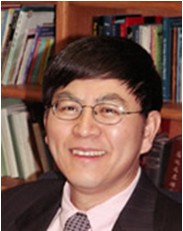
Zhang Shengbai (张绳百 教授)
Senior Chair, Kodosky Constellation Professor in Physics
Rensselaer Polytechnic Institute, Troy, New York
Abstract: Today’s electronics is based on semiconductors with parabolic energy dispersion. Recently, Dirac fermions, where the energy dispersion near the Fermi level is linear, have attracted considerable attention for their unique electronic properties. Two noticeable examples are the topological insulator (TI) and graphene. The realization of the great promises of the TI, however, requires the control of its defect states. In this talk, I will discuss first-principles calculation of minimum intrinsic defect density in pnictogen chalcogenides. As it turns out, defect physics of TI can be qualitatively different from that of ordinary semiconductor, as spin-orbit coupling in a TI can be so large to convert an acceptor into a donor. I will also discuss how to engineer Dirac cone at the Fermi level of strongly bound graphene on a SiC substrate using transition metal (TM) intercalation. The significantly increased spin-orbit coupling suggests that the graphene/TM/SiC system could be a two-dimensional TI.
About the speaker: Prof. Zhang received his Ph. D. in Physics from the University of California at Berkeley in 1989, and then joined Xerox PARC in Palo Alto, California, where he performed postdoctoral research. In 1991, he moved to the National Renewable Energy Laboratory (NREL) in Golden, Colorado and became group leader for Computational Materials Science in 2005. In 2008, he was appointed Senior Kodosky Constellation Chair at Rensselaer Polytechnic Institute. Prof. Zhang has a broad theoretical research background in computational materials physics, which covers a range of inorganic and organic semiconductors and solids for bulk properties, defect structures, and surface physics. His most recent work involves earth-abundant photovoltaic materials, phase change memory materials, van der Waals interaction in organic semiconductors, lithium battery materials, hydrogen storage, topological insulators, graphene, and excited state dynamics. Dr. Zhang has more than 250 peer-reviewed publications with 8,700 citations (H index = 50). He has been a Fellow of the American Physical Society since 2001.
DateTime: July 26, 2012 (Thursday), 10:00 – 11:00
Location: 606 Conference Room


